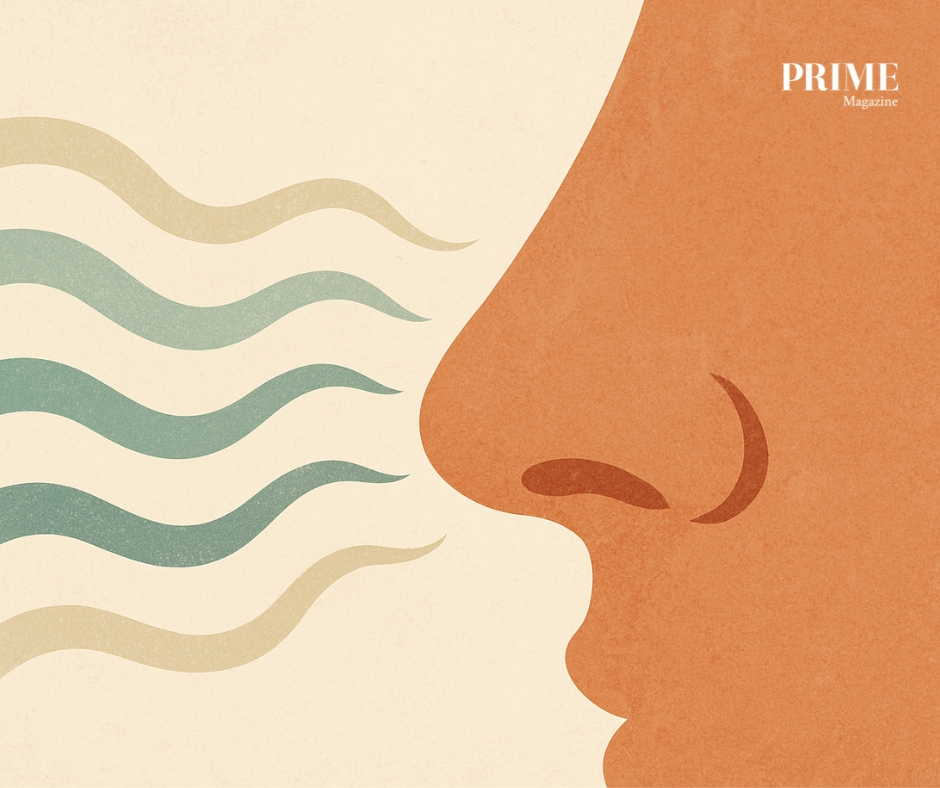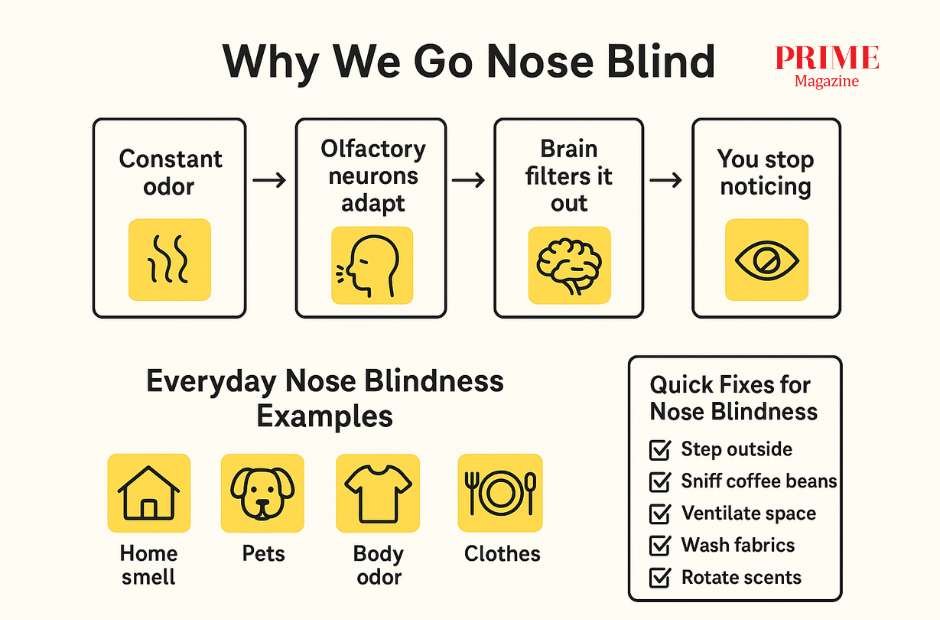Ever notice how you stop smelling your own home, or you can’t tell if you have body odor until someone else points it out? You’re not alone – you may be “nose blind.” Nose blindness, formally known as olfactory fatigue or olfactory adaptation, is a normal phenomenon where your nose and brain tune out constant smells in your environment.
It’s the reason a restaurant’s aroma hits you strongly at first but fades after a while. It’s why pet owners often don’t notice the “dog smell” in their house, even though a guest smells it immediately. In short, your sense of smell essentially goes on autopilot for familiar odors.
The Science of Olfactory Fatigue 
Our sense of smell is designed to detect changes, not background constants. Every day, your nose feeds your brain a constant stream of scent information. If your brain paid equal attention to all these smells, it would be overwhelmed.
As a protective measure, your scent receptors and brain adapt. After continuous exposure to a particular odor, the olfactory neurons stop firing signals for that smell. In other words, your brain filters it out as “background noise.”
This neural adaptation, called odor fatigue, prevents sensory overload and frees you to notice new or important smells. By ignoring the usual musty scent of your basement, for example, your nose is primed to alert you if something odd – like smoke or a gas leak – suddenly appears.
This is an evolutionary advantage that kept our ancestors alive, and it’s perfectly normal. Just to be clear, nose blindness is temporary and specific to certain odors; it’s different from conditions like anosmia, which is a total or permanent loss of smell.
Everyday Examples of Going “Nose Blind”
We all experience olfactory adaptation in daily life. Here are some common scenarios.
Your Home’s Signature Scent
Every home and workplace has a particular smell – be it last night’s curry, a cinnamon air freshener, or the collective mix of furniture and people. You usually don’t notice your “home smell” because you live in it. But go on holiday and come back, and you might suddenly detect a musty odor or the pungent aroma of that durian you left in the fridge. Guests, of course, notice these scents right away.
Pet Odors
If you have indoor pets, you might not register the wet dog scent or litter box odor after a while. Visitors, however, walk in and instantly know you have a cat or dog. The same goes for other persistent odors like cigarette smoke; smokers often can’t smell smoke on their clothes or in their car, but non-smokers can.
Body Odor and Fragrance
Perhaps the most relatable example is one’s own body odor. After a workout or a hot day in Singapore’s tropical climate, you might not smell your own sweat, but others can. Your brain has tuned out your personal scent – a mix of your soap, laundry detergent, and natural odors.
This also applies to perfume or cologne. You may stop smelling your signature scent shortly after applying it, leading some to spray on more than necessary. Meanwhile, everyone around you is overwhelmed by the fragrance you can no longer detect.
Clothes and Fabrics
You might become nose blind to the smell of your sheets or clothes. Fabrics slowly accumulate odors from sweat, mildew, or food, but because the change is gradual, your nose adjusts. That’s why someone else might comment that your jacket reeks of barbecue smoke even though you didn’t notice.
Workplaces and Hawker Centres
Think of hawker centers and kopitiams in Singapore. When you first enter, the mix of food aromas is intense. But if you work there or sit for an hour, you hardly notice it. Kitchen staff might not perceive the strong fish or spice smells that a newcomer would.
Similarly, if your office has a distinct smell, you likely don’t sense it during the day. But a visitor or a returning worker after the weekend will.
Why Some People Smell More (or Less) than Others
Not everyone’s sense of smell is equal. Several factors influence how sensitive you are to odors and how quickly you go nose blind.
Age
Our ability to smell tends to peak in early adulthood and can decline as we get older. By the time people reach their later years, many have a reduced sense of smell. This means an older person might not notice mild odors that a younger person would.
Gender
Women generally outperform men in smell tests and sensitivity. Research shows that females, on average, can detect odors at lower concentrations and identify them more accurately than males. Hormones also play a role – many women report a heightened sense of smell during pregnancy.
Genetics
Each of us has about 400 types of smell receptors. Genetic variations can mean some people are extremely sensitive to certain odors while others can’t smell those same compounds at all.
Genetics can also influence how much body odor you produce. For example, a gene variant common in East Asian populations leads to very little underarm odor, which has shaped cultural norms around deodorant use.
Environment and Habits
Your environment can train your nose. If you’re regularly exposed to strong smells, your nose may adapt and become less bothered by them. A chef working with spices every day, or a fishmonger in a wet market, probably develops a higher tolerance.
Lifestyle habits matter too. Smokers often have a dulled sense of smell compared to non-smokers. People who train their sense of smell, such as wine tasters or perfumers, may notice subtle scents that others miss.
Why Nose Blindness Matters
For the most part, nose blindness is harmless – even helpful. It allows you to focus on important scent signals without distraction from the mundane ones. But there are downsides to consider.
Hygiene and Health
If you go nose blind to your own environment, you might not realize when something needs cleaning. You may miss early warning signs of spoilage or mildew. Nose blindness can also delay your awareness of personal hygiene issues.
While nose blindness filters steady odors, extremely strong smells can desensitize you and mask hazards. For example, someone exposed to constant chemical smells might not detect a gas leak as quickly.
Social Awareness
Scent is a subtle but powerful part of how we interact. Unpleasant odors can affect how others perceive us. In Singapore and across Asia, social norms emphasize keeping communal spaces neutral and fresh.
That’s why durians, the famously pungent fruit, are banned on public transport and in many hotels. Being unaware of smells you’ve tuned out can inadvertently breach social courtesies.
On a positive note, everyone experiences nose blindness, so we’re all in the same boat. Being aware of it means you can take steps to ensure you and your space are as fresh as you think.
How to Reset Your Nose and Refresh Your Space
While you can’t stop olfactory adaptation, you can manage it. Here are practical tips:
-
Step outside for a few minutes and return with a “fresh nose.”
-
Use tricks to reset your sense of smell – sniff coffee beans or even your own clean skin.
-
Increase ventilation by opening windows or using fans and dehumidifiers.
-
Clean regularly rather than masking smells with sprays. Wash fabrics, vacuum carpets, and clear out trash even if you don’t smell it.
-
Use odor absorbers like baking soda, charcoal, or vinegar bowls.
-
Rotate scents if you use fragrances at home.
-
Be mindful – pause occasionally to sniff and register your surroundings consciously.
And when in doubt, ask a trusted friend for feedback. Sometimes we need another person’s nose to confirm what we can’t detect ourselves.
Sniffing Out the Conclusion
“Nose blind” might sound like a problem, but it’s really a natural part of how our senses work. Our olfactory system constantly adapts, tuning out familiar smells so that new scents stand out.
Understanding this helps us be more mindful of our environment and personal hygiene. Just because you can’t smell something doesn’t mean it’s not there. By keeping things clean, airing out spaces, and resetting your nose, you can ensure your surroundings are as fresh as you imagine.
So, the next time someone jokes that you’re nose blind, you can smile and say, “Yes, it happens to all of us.” After all, being nose blind just means your brain and nose are working together to help you navigate a world of smells – you just need to give them a helpful nudge now and then. PRIME

















Leave A Comment